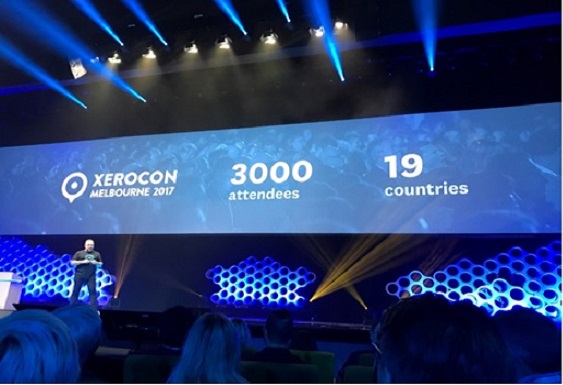Posted on November 22, 2017 by Chris Grieve
On the 12th and 13th of September the management team at GeersSullivan attended the annual two day Xerocon event at the Melbourne Convention Centre.

Since its introduction the accounting software package Xero has challenged the status quo in the accounting industry and forced it to reconsider the way in which we approach our work. GeersSullivan fully embraced this when we successfully transferred our internal practice management system from MYOB AE to Xero Practice Management. With any significant change in an organisation it was not without its challenges, however through good planning and the buy in of our amazing team we are now utilising the Xero Practise Management environment to its full potential. This has resulted in the following benefits:
- A smaller carbon footprint as we further reduce our use of paper as we fully utilise the paperless office system
- Mobility of accountants as all client data is securely accessible remotely allowing us to work effectively anywhere in the world without taking files
- Automation of certain data entry aspects
- Allowing us to provide end to end services effectively taking on bookkeeping duties right through to periodic advisory using real time figures
The above benefits are not limited to us, they can also be achieved in your business. Xero is a cloud based accounting software package that, amongst other things allows efficiency of data entry and ease of access for advisors.
Over 3000 advisors attended the annual conference which in addition to using the software itself included presentations on:
- Running a business in the age of machines
- Working with apps
- Cloud security
- Machine learning and Artificial intelligence
- Building positive workplaces
The conference also included a number of exhibitors promoting specialised software that integrates with a client’s internal software providing more powerful and/or industry specific software. These included:
- Boma – an application that generates marketing material that can be easily disseminated across a variety of multi-media platforms
- Futrli – an application that allows tailored key data reporting and graphical display of clients results
- Fathom – which is a reporting and financial analysis tool.
- Jet Convert – allows clients to easily migrate their existing data to the Xero platform
- Receipt Bank – an app which scans receipts from suppliers and automatically pre populates the details into Xero
- Tanda – Cloud workforce management application
The conference also provided an invaluable opportunity to discuss with our peers issues relating to the use of the software and best practise (without giving away our trade secrets to local competitors!).
If you would like to free up valuable time and money by having your bookkeeping much more automated call us today.
Share this:
Posted on by Tom Francis
Buying an older, run down house in a good location and redeveloping the site has become such a popular investment option in Perth that building companies now operate specialised divisions to service this market. While the building process has become easier the tax law surrounding the projects remains complex and unless properly considered can quickly eat through any potential profits.
Between 2008 and 2010 an experienced property developer, who unfortunately was not a GeersSullivan client, completed construction of 12 apartments in Mandurah. The sudden downturn in the market caused by the Global Financial Crisis prevented a quick sale of the apartments and it was 2015 before the final sales were completed. The downturn in the market was so severe that the developer recorded an average loss on each unit of over $100,000. Before commencing the project, the developer had consulted with his accountant who advised that the sale of land and buildings could be treated as a capital gains tax event. The developer had received conflicting advice from friends involved in similar projects but chose to push ahead.
In 2015 the ATO commenced an audit of the developer’s 2010-2014 tax returns and amended the capital losses to ordinary losses upon determining that the developer was in the business of property developing based on his intentions in commencing the project. As part of this determination the ATO registered the developer for GST and treated each property sale as a taxable supply. The developer was required to remit 10% of the sale price of each unit to the ATO, though fortunately was spared any penalty or interest charges. As it had been over 4 years since the expenses were incurred, the developer was outside of the BAS amendment window and was unable to retrospectively claim any GST credits on the cost of building the apartments or to apply the margin scheme.
In total, the developer lost close to $2 million on the project. If he had received proper accounting advice and support this loss would have been reduced by over $660,000.
While this is an extreme case, the above holds some key lessons for all tax payers considering property development as an investment choice:
- The act of buying land for the purpose of building and selling houses or apartments is likely to constitute an enterprise and the tax payer will likely need to register for an ABN and GST.
- The ATO pay close attention to the intent of the tax payer when determining if they are in business; in the example above the tax payer was clearly setting out to make a profit from their property development and not simply realise an asset for the highest possible value.
- While having to remit GST can squeeze the margins of any development, failing to register can have expensive consequences in the event of an audit.
- If you have any doubts about the advice given to you by your accountant, ask them to explain the legal context behind their opinion and provide proof for their reasoning.
Share this:

